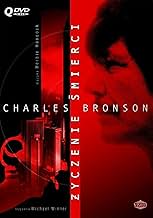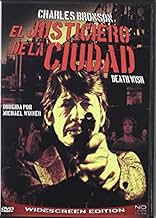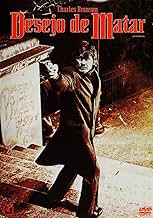A New York City architect becomes a one-man vigilante squad after his wife is murdered by street punks. In self-defense, the vengeful man kills muggers on the mean streets after dark.A New York City architect becomes a one-man vigilante squad after his wife is murdered by street punks. In self-defense, the vengeful man kills muggers on the mean streets after dark.A New York City architect becomes a one-man vigilante squad after his wife is murdered by street punks. In self-defense, the vengeful man kills muggers on the mean streets after dark.
- Director
- Writers
- Stars
- Awards
- 1 win & 2 nominations total
- District Attorney
- (as Fred Scollay)
- Lt. Briggs
- (as Ed Grover)
- Director
- Writers
- All cast & crew
- Production, box office & more at IMDbPro
Featured reviews
"Death Wish" was a highly controversial film when initially released. At the time, major cities were facing a deadly crime epidemic, and this film tapped into the fears and unspoken desires of many viewers, giving them a chance to live out their secret fantasies. Critics on the Left lambasted its politics on crime, and even some on the Right felt it went too far. One could find much to complain about from an ideological standpoint. One could point out that the film is manipulative and heavy-handed (the attack on Kersey's family comes right after his co-worker tells him he's a "bleeding-heart liberal"). Yet, it is undeniably compelling; one of these movies that makes you wonder, "what if this happened to me?" In light of the later, inferior sequels, it is fascinating to see how the character came to be, how he made the transition from law-abiding man to cold-blooded vigilante. It is not an easy transition to make by any means--after his first kill, he breaks down and vomits the moment he reaches home. Yet, as his kills (each is very suspensefully handled) occur with greater frequency, we get the sinking feeling that he has reached a point of no return. Indeed, he narrowly eludes capture on at least two occasions, and there is the certainty that it is only a matter of time before the law will catch up with him.
Bronson is highly effective here; while not one of the great actors, he has a very strong screen presence. The audience is on his side every step of the way, rooting for him even as he strays onto the wrong side of the law. Surely, he is entitled to justice, but at what point does his vengeance outweigh his grievances? Vincent Gardenia is effective as the police detective assigned to his case. He grudgingly admires Kersey's resolve, although he is sworn to put a stop to the killings. The manner in which this is resolved is creative, though its plausibility is less than certain. The film is also noticeable for an early appearance by Jeff Goldblum as a slimy thug. However, Steven Keats is somewhat ineffectual as Bronson's son-in-law (he just sorta got on my nerves). In the years to come, this film would be followed by an endless chain of sequels and rip-offs, many of them starring Bronson himself, reducing him to a stock character whose only attribute was blowing the bad guys away. A shame, considering he was once an internationally respected actor. "Death Wish" is nonetheless a well-crafted, tightly paced crime drama, despite some dated aspects. It still kept me interested throughout and made me more interested in viewing more of the star's other films--good or otherwise.
Rating: *** (out of ****)
Released by Paramount Pictures
New York businessman Paul Kersey (Charles Bronson) is devastated when his wife (Hope Lange) and daughter (Kathleen Tolan) are sexually assaulted in their own home. His wife dies from her injuries and his daughter is so deeply traumatized that she is left in a permanent vegetative state. Kersey tries to get some normality back into his life through work, but deep down inside he's burning for revenge. He knows he will never get the actual gang who harmed his family, but he also realises that crime in general is spreading through the city like a plague. So, armed with a gun and a sense of vigilante justice, he starts patrolling the streets by night, killing muggers, hoodlums and rapists. But for how long can he hand out his own brand of justice without being caught? And at what point does his course of action stop being justifiable? When does he become just as bad as the crooks he is trying to rub out?
The film is based on a Brian Garfield novel, but in the book vigilantism was illustrated as an extension of crime - just another problem as opposed to a solution. Here Michael Winner, a director always happy to create a few ripples, presents the vigilante as an out-and-out hero. The film basically gives a great big nod of approval to Kersey's actions. The sense of humour really helps the film (I still laugh at the scene where some construction-workers kick the hell out of a crook, and one workman nonchalantly states to the TV reporters: "Erm, we roughed him up a bit before the cops arrived!") Death Wish was a pretty influential film for its era, and in spite of its dated air and its morally dubious stance, it is still a great flick. Just make sure you steer clear of its four utterly terrible sequels.
Rather than Bronson's performance Death Wish has its significant themes and screenplay components which were used at almost every action/crime movie later on, thus became clichés of their genre. Spending a lot of the running time through the bad guys' side is the most fundamental component. This development was so modern and original, after a while it changed the outlook of the Crime genre.
Death Wish is nearly as good as Eastwood's Dirty Harry, with just a different taste. Obviously, this should have been produced only once; since the sequels misrepresented its purpose.
Highly recommended.
A.
In this the original Death Wish, Charles Bronson introduces us to Paul Kersey, successful architect and family man with wife Hope Lange and married daughter Kathleen Tolan. Bronson's well ordered life takes an abrupt change when a home invasion robbery results in the death of Hope Lange and the rape of Kathleen Tolan.
All the acting is done with facial expressions here. Bronson usually plays stoic characters in his films, but in the Death Wish series he never articulates what's going on with him, but you see it in a face that was made for movie closeups in the same way that Gary Cooper's and John Wayne's faces were.
A trip out west on a project brings him in touch with a different mentality about settling urban problems and the present of a 32 Caliber pistol from the man he was contracted to work for gives Bronson a whole new outlook. And a mission in life to rid the world of street criminals.
1974 may have been the year Richard Nixon had his downfall, but this was the president elected on a law and order platform. George Wallace sent his audiences into delight when he talked about running protesters down with his vehicle. Death Wish struck quite a nerve with the American public because unlike Dirty Harry, Bronson was a citizen like you and me who just decided to act.
There are two really good supporting performances in Death Wish. A New Yorker to his fingertips, Vincent Gardenia plays the dogged police detective who's put on the vigilante killer case. And Stuart Margolin as Bronson's western host who presents him with the tool of his trade is also worth noting.
In 1982 Bronson finally due to a lot of audience demand and the fact that the money was too good to turn down, repeated his role of Paul Kersey in a series of Death Wish films of varying quality. Nothing like this one though.
Did you know
- TriviaAfter finishing Le cercle noir (1973), Charles Bronson and Michael Winner wanted to make another film together, and were discussing further projects. "What do we do next?" asked Bronson. "The best script I've got is 'Death Wish'. It's about a man whose wife and daughter are mugged and he goes out and shoots muggers," said Winner. "I'd like to do that," Bronson said. "The film?" asked Winner. Bronson replied, "No . . . shoot muggers."
- GoofsKersey's first shooting victim is hit in the abdomen, but a police investigator at the crime scene the next morning refers to a bullet hole in his chest.
- Quotes
Paul Kersey: Nothing to do but cut and run, huh? What else? What about the old American social custom of self-defense? If the police don't defend us, maybe we ought to do it ourselves.
Jack Toby: We're not pioneers anymore, Dad.
Paul Kersey: What are we, Jack?
Jack Toby: What do you mean?
Paul Kersey: I mean, if we're not pioneers, what have we become? What do you call people who, when they're faced with a condition or fear, do nothing about it. They just run and hide?
Jack Toby: Civilized?
Paul Kersey: No.
- Crazy creditsActresses Olympia Dukakis ('Cop at the Precinct') and Marcia Jean Kurtz as Marcia Jean-Kurtz ('Woman at Airport') get credited in opening credits only. There's no mention of them in the closing credits.
- Alternate versionsThe UK version classified in 2006 by the British Board of Film Classification retained the 18 certificate, but all of the BBFC's previous cuts were waived.
- ConnectionsFeatured in Precious Images (1986)
- SoundtracksDeath Wish (Main Title)
Written and Performed by Herbie Hancock
Details
- Release date
- Country of origin
- Languages
- Also known as
- El vengador anónimo
- Filming locations
- Bear Down Gym, University of Arizona, Tucson, Arizona, USA(basement firing range)
- Production companies
- See more company credits at IMDbPro
Box office
- Budget
- $3,000,000 (estimated)
- Gross US & Canada
- $22,000,000
- Gross worldwide
- $22,000,000
- Runtime
- 1h 33m(93 min)
- Sound mix
- Aspect ratio
- 1.85 : 1










































